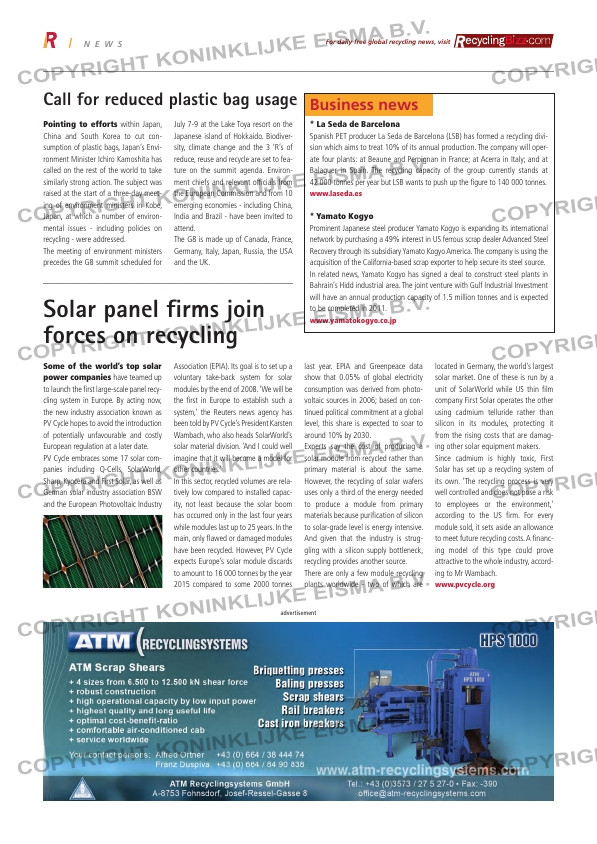Page 15 from: June / July 2008

For daily free global recycling news, visit N E W S
advertisement
Business news
* La Seda de Barcelona
Spanish PET producer La Seda de Barcelona (LSB) has formed a recycling divi-
sion which aims to treat 10% of its annual production. The company will oper-
ate four plants: at Beaune and Perpignan in France; at Acerra in Italy; and at
Balaguer in Spain. The recycling capacity of the group currently stands at
42 000 tonnes per year but LSB wants to push up the figure to 140 000 tonnes.
www.laseda.es
* Yamato Kogyo
Prominent Japanese steel producer Yamato Kogyo is expanding its international
network by purchasing a 49% interest in US ferrous scrap dealer Advanced Steel
Recovery through its subsidiary Yamato Kogyo America. The company is using the
acquisition of the California-based scrap exporter to help secure its steel source.
In related news, Yamato Kogyo has signed a deal to construct steel plants in
Bahrain’s Hidd industrial area. The joint venture with Gulf Industrial Investment
will have an annual production capacity of 1.5 million tonnes and is expected
to be completed in 2011.
www.yamatokogyo.co.jp
Some of the world’s top solar
power companies have teamed up
to launch the first large-scale panel recy-
cling system in Europe. By acting now,
the new industry association known as
PV Cycle hopes to avoid the introduction
of potentially unfavourable and costly
European regulation at a later date.
PV Cycle embraces some 17 solar com-
panies including Q-Cells, SolarWorld,
Sharp, Kyocera and First Solar, as well as
German solar industry association BSW
and the European Photovoltaic Industry
Association (EPIA). Its goal is to set up a
voluntary take-back system for solar
modules by the end of 2008. ‘We will be
the first in Europe to establish such a
system,’ the Reuters news agency has
been told by PV Cycle’s President Karsten
Wambach, who also heads SolarWorld’s
solar material division. ‘And I could well
imagine that it will become a model for
other countries.’
In this sector, recycled volumes are rela-
tively low compared to installed capac-
ity, not least because the solar boom
has occurred only in the last four years
while modules last up to 25 years. In the
main, only flawed or damaged modules
have been recycled. However, PV Cycle
expects Europe’s solar module discards
to amount to 16 000 tonnes by the year
2015 compared to some 2000 tonnes
last year. EPIA and Greenpeace data
show that 0.05% of global electricity
consumption was derived from photo-
voltaic sources in 2006; based on con-
tinued political commitment at a global
level, this share is expected to soar to
around 10% by 2030.
Experts say the cost of producing a
solar module from recycled rather than
primary material is about the same.
However, the recycling of solar wafers
uses only a third of the energy needed
to produce a module from primary
materials because purification of silicon
to solar-grade level is energy intensive.
And given that the industry is strug-
gling with a silicon supply bottleneck,
recycling provides another source.
There are only a few module recycling
plants worldwide – two of which are
located in Germany, the world’s largest
solar market. One of these is run by a
unit of SolarWorld while US thin film
company First Solar operates the other
using cadmium telluride rather than
silicon in its modules, protecting it
from the rising costs that are damag-
ing other solar equipment makers.
Since cadmium is highly toxic, First
Solar has set up a recycling system of
its own. ‘The recycling process is very
well controlled and does not pose a risk
to employees or the environment,’
according to the US firm. For every
module sold, it sets aside an allowance
to meet future recycling costs. A financ-
ing model of this type could prove
attractive to the whole industry, accord-
ing to Mr Wambach.
www.pvcycle.org
Solar panel firms join
forces on recycling
Pointing to efforts within Japan,
China and South Korea to cut con-
sumption of plastic bags, Japan’s Envi-
ronment Minister Ichiro Kamoshita has
called on the rest of the world to take
similarly strong action. The subject was
raised at the start of a three-day meet-
ing of environment ministers in Kobe,
Japan, at which a number of environ-
mental issues – including policies on
recycling – were addressed.
The meeting of environment ministers
precedes the G8 summit scheduled for
July 7-9 at the Lake Toya resort on the
Japanese island of Hokkaido. Biodiver-
sity, climate change and the 3 ‘R’s of
reduce, reuse and recycle are set to fea-
ture on the summit agenda. Environ-
ment chiefs and relevant officials from
the European Commission and from 10
emerging economies – including China,
India and Brazil – have been invited to
attend.
The G8 is made up of Canada, France,
Germany, Italy, Japan, Russia, the USA
and the UK.
Call for reduced plastic bag usage
RI_029_NEWS.indd 15 19-06-2008 14:41:18



